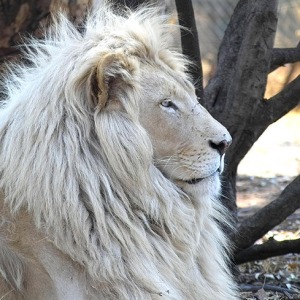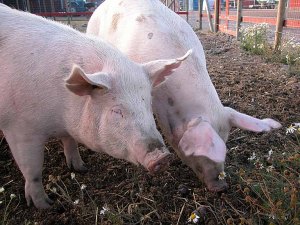
Paws Up!
To Ohio Representative John Barnes, Jr. for sponsoring a bill to ban continuous dog chaining in Ohio.

Dogs require daily socialization, exercise, and shelter to live happy lives.
The practice of continually tethering pets outside for extended periods of time is known to be both harmful to animals and the communities they live in. Chained dogs are vulnerable to extreme boredom and frustration as result of isolation and lack of exercise. In addition to the psychological stress caused by long-term chaining, dogs who are chained continuously are vulnerable to extreme weather, attacks by other animals, and infestation by disease-carrying insects. Many dogs who are chained can also become entangled in the chain itself, resulting in injury and even strangulation. Dogs living under these conditions are not provided with opportunities to be good canine citizens and may be more likely to bark, lunge, or snap at passing people or other animals.
In an attempt to rescue dogs and other animals from the fate of life on a chain, Ohio Representative John Barnes, Jr. has introduced H.B. 94, also known as the Animal Protection Initiative. The bill was introduced to the Committee on Agriculture and Rural Development on March 4, 2015. If passed into law, this bill would drastically limit the conditions under which an animal can be legally chained or tethered. Specifically, owners would not be permitted to chain any animal for longer than two consecutive hours. After two consecutive hours, owners would be required to relieve the animal from the tether for a minimum of one hour. Provisions under the law also stipulate conditions under which an animal can be tethered. For instance, the law would prohibit the tethering of an animal for more than six hours in a 24-hour period, between the hours of 10:00pm and 6:00am, in severe weather, or in an unsanitary environment. Violators of the law would be subject to a fine and possible seizure of animals from the property.
Take action. Residents of Ohio, contact your representatives and urge them to pass H.B. 94, also known as the Animal Protection Initiative.
 In a recent news article, Ellen Zoppo-Sassu, a Bristol City Councilwoman, related the terms of an ordinance that was passed concerning feral cat overpopulation in the area. It is volunteer-based and complaint-driven. Under the new ordinance, anyone with a cat over the age of six months will be required to have him or her spayed or neutered. Those who disregard the ordinance could face a $90 fine. The ordinance aims to decrease the feral cat population in the area.
In a recent news article, Ellen Zoppo-Sassu, a Bristol City Councilwoman, related the terms of an ordinance that was passed concerning feral cat overpopulation in the area. It is volunteer-based and complaint-driven. Under the new ordinance, anyone with a cat over the age of six months will be required to have him or her spayed or neutered. Those who disregard the ordinance could face a $90 fine. The ordinance aims to decrease the feral cat population in the area.












